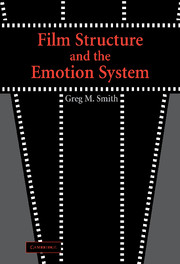Book contents
- Frontmatter
- Contents
- Film Structure and the Emotion System
- PART ONE DEVELOPING THE APPROACH
- PART TWO ANALYZING EMOTIONAL APPEALS IN FILM
- 5 “Couldn't You Read between Those Pitiful Lines?”: Feeling for Stella Dallas
- 6 Strike-ing Out: The Partial Success of Early Eisenstein's Emotional Appeal
- 7 Lyricism and Unevenness: Emotional Transitions in Renoir's A Day in the Country and The Lower Depths
- 8 Emotion Work: The Joy Luck Club and the Limits of the Emotion System
- 9 “I Was Misinformed”: Nostalgia and Uncertainty in Casablanca
- PART THREE AFTERWORD
- APPENDIX. The Neurological Basis of Psychoanalytic Film Theory: Metz's Emotional Debt to Freud the Biologist
- Notes
- Index
9 - “I Was Misinformed”: Nostalgia and Uncertainty in Casablanca
Published online by Cambridge University Press: 27 July 2009
- Frontmatter
- Contents
- Film Structure and the Emotion System
- PART ONE DEVELOPING THE APPROACH
- PART TWO ANALYZING EMOTIONAL APPEALS IN FILM
- 5 “Couldn't You Read between Those Pitiful Lines?”: Feeling for Stella Dallas
- 6 Strike-ing Out: The Partial Success of Early Eisenstein's Emotional Appeal
- 7 Lyricism and Unevenness: Emotional Transitions in Renoir's A Day in the Country and The Lower Depths
- 8 Emotion Work: The Joy Luck Club and the Limits of the Emotion System
- 9 “I Was Misinformed”: Nostalgia and Uncertainty in Casablanca
- PART THREE AFTERWORD
- APPENDIX. The Neurological Basis of Psychoanalytic Film Theory: Metz's Emotional Debt to Freud the Biologist
- Notes
- Index
Summary
When I teach my introduction to film criticism course, I sometimes let my students choose to analyze one of a select list of classical Hollywood films as their midterm project. If an individual student wants to examine a particular film that is not on the list, I usually grant permission for him or her to do so (if I am familiar with the text). There is only one film that I have consistently forbidden my introductory students to analyze: Casablanca. When students ask, “Why not?” I usually tell them that the film is just too difficult for a beginning critic to analyze. It's too close to the classical ideal of “invisible style” to discuss its visual aesthetic, I argue, and the film depends too much on the “charisma” of the stars, which is another difficult concept to dissect. The remarkable thing about Casablanca is that it's difficult to describe what's remarkable about it.
Academics from Umberto Eco to Dana Polan to Robert Ray have tried to pin the film's appeal down. Many accounts foreground the extrafilmic discourses that have depicted the production of Casablanca as the Hollywood version of the discovery of penicillin, as a haphazard confluence of several factors that happened to come together to make a classic. For instance, Andrew Sarris has called Casablanca “the happiest of happy accidents.”
- Type
- Chapter
- Information
- Film Structure and the Emotion System , pp. 151 - 166Publisher: Cambridge University PressPrint publication year: 2003



